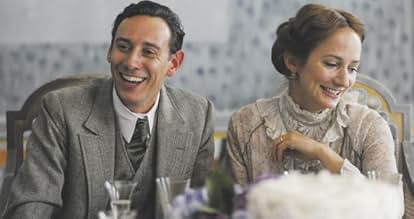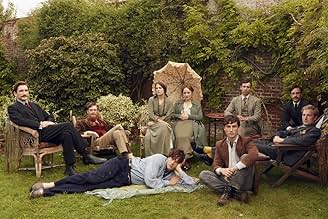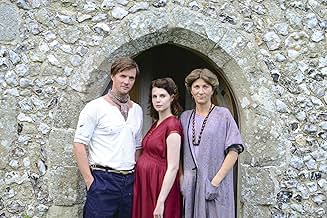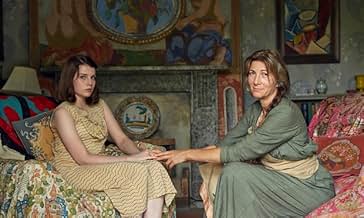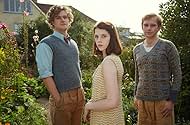Adicionar um enredo no seu idiomaAn intimate and emotional drama for BBC Two about the revolutionary Bloomsbury group.An intimate and emotional drama for BBC Two about the revolutionary Bloomsbury group.An intimate and emotional drama for BBC Two about the revolutionary Bloomsbury group.
Explorar episódios
Avaliações em destaque
Given that this short series involves quite a few flashbacks and a relatively large cast of characters, the choice to have different actors play the "younger" and "older" versions of some of them really doesn't help, I think. Not only does this make it hard sometimes to work out who they are, but it leads to harsh comparisons of the performance (and in some cases the looks) of a few of them. Apart from the children, this would have been better done with make-up, I feel. In particular, Phoebe Fox is so great as Vanessa Bell that she is sorely missed in episode three. No offence to Eve Best, but she comes across as a completely different person - not only does she look nothing like Fox, but Vanessa feels "gone".
Having said that, it was nice not to have painful and protracted exposition of who all these people were, as collectively there would have been too much to fit in - and the series would have felt even more episodic than it sometimes does. As it is, the classic period drama cliches of "terrible things happening far away" are present and correct, as are their very real tragic effects, but the underlying aura of very privileged people playing around lingers.
Worth a look - although really only a 6 out of 10, IMHO. I gave it the 7th for Phoebe.
Having said that, it was nice not to have painful and protracted exposition of who all these people were, as collectively there would have been too much to fit in - and the series would have felt even more episodic than it sometimes does. As it is, the classic period drama cliches of "terrible things happening far away" are present and correct, as are their very real tragic effects, but the underlying aura of very privileged people playing around lingers.
Worth a look - although really only a 6 out of 10, IMHO. I gave it the 7th for Phoebe.
Although I did not expect it, I found LIFE IN SQUARES to be a remarkable piece of television drama, offering insights into the lives of the Bloomsbury Group that I had never previously thought of.
The title is a clever one, suggesting the bourgeois existence of the Stephen sisters Virginia and Vanessa (played by Lydia Leonard, Eve Best, Phoebe Fox, and Catherine McCormack across the three-episode structure) where they grew up in luxury, but also denoting imprisonment, both mental and emotional. David Roger's production designs, with elegant rooms heavily over-stuffed with curios of all historical periods, restrict the actors' freedom of movement; they are forced to move round chairs, or negotiate too many ornaments. When the Bloomsbury Group meet for their regular soirées, they do so in small, confined rooms, with little room to breathe.
This kind of goldfish-bowl lifestyle inevitably has a significant effect on the Group's life-choices. While dedicating themselves to ideals of artistic purity that transcend the mundane concerns of early twentieth century Britain, we wonder whether that represents nothing more than a form of futile release from conformity. This is especially summed up in Vanessa Bell's checkered career; a talented artist in her own right, she becomes so much subject to her husband Clive's (Sam Hoare/ Andrew Havill's) bidding that she ends up losing her artistic will. She embarks on a long-term relationship with Duncan Grant (James Norton/ Rupert Penry-Jones), but finds little emotional satisfaction there - despite his undying devotion to her, he remains a professed homosexual.
Virginia experiences equal pains. We know from the start that she is mentally fragile, but it seems that her sister's overbearing nature, coupled with the prevailing ideology that all wives should have children at that time, pushes her into marriage with Leonard Woolf (Al Weaver. Guy Henry), Although the two enjoy a tranquil and often fulfilling life, it is not what Virginia wants. She tries to find solace in her writing, but even that is not enough to prevent her from committing suicide at the outbreak of World War II. From this drama, we get the sense of terrible sorrow that such an innovator should have felt so hemmed in by social and mental pressures that she should take her own life.
The sisters' existence does not change, even when they sacrifice London for the country, and Vanessa's family moves into Charleston, an idealized retreat still open to general visitors. Life there becomes even more claustrophobic, especially when Duncan's boyfriend David Garnett (aka Bunny) (Ben Lloyd-Hughes/ Jack Davenport) moves in. Vanessa is often forced into the role of unwilling peacemaker; at length she ends up doing something that she felt she must do, but ends up causing her lasting mental pain and suffering.
What makes LIFE IN SQUARES such a game-changing piece is that its sympathy extends to male and female characters alike. Would-be critics like Roger Fry (Elliott Cowan) are trying to make their way in the world as they pronounce on the effect of Modernism on the post-1918 universe, but they appear to lack the conviction to do so. This is chiefly due to their environment; the hothouse world of London (and provincial) society is so insulated from from worldly affairs that it ends up feeding on itself.
Brilliantly directed by Simon Kaijser from a script by Amanda Coe, LIFE IN SQUARES offers important material for reflection on the power as well as the limitations of the imagination, and how we must remain mindful of ourselves and our well-being rather than subjecting ourselves to the often restrictive dictates of prevailing socio-economic convention.
The title is a clever one, suggesting the bourgeois existence of the Stephen sisters Virginia and Vanessa (played by Lydia Leonard, Eve Best, Phoebe Fox, and Catherine McCormack across the three-episode structure) where they grew up in luxury, but also denoting imprisonment, both mental and emotional. David Roger's production designs, with elegant rooms heavily over-stuffed with curios of all historical periods, restrict the actors' freedom of movement; they are forced to move round chairs, or negotiate too many ornaments. When the Bloomsbury Group meet for their regular soirées, they do so in small, confined rooms, with little room to breathe.
This kind of goldfish-bowl lifestyle inevitably has a significant effect on the Group's life-choices. While dedicating themselves to ideals of artistic purity that transcend the mundane concerns of early twentieth century Britain, we wonder whether that represents nothing more than a form of futile release from conformity. This is especially summed up in Vanessa Bell's checkered career; a talented artist in her own right, she becomes so much subject to her husband Clive's (Sam Hoare/ Andrew Havill's) bidding that she ends up losing her artistic will. She embarks on a long-term relationship with Duncan Grant (James Norton/ Rupert Penry-Jones), but finds little emotional satisfaction there - despite his undying devotion to her, he remains a professed homosexual.
Virginia experiences equal pains. We know from the start that she is mentally fragile, but it seems that her sister's overbearing nature, coupled with the prevailing ideology that all wives should have children at that time, pushes her into marriage with Leonard Woolf (Al Weaver. Guy Henry), Although the two enjoy a tranquil and often fulfilling life, it is not what Virginia wants. She tries to find solace in her writing, but even that is not enough to prevent her from committing suicide at the outbreak of World War II. From this drama, we get the sense of terrible sorrow that such an innovator should have felt so hemmed in by social and mental pressures that she should take her own life.
The sisters' existence does not change, even when they sacrifice London for the country, and Vanessa's family moves into Charleston, an idealized retreat still open to general visitors. Life there becomes even more claustrophobic, especially when Duncan's boyfriend David Garnett (aka Bunny) (Ben Lloyd-Hughes/ Jack Davenport) moves in. Vanessa is often forced into the role of unwilling peacemaker; at length she ends up doing something that she felt she must do, but ends up causing her lasting mental pain and suffering.
What makes LIFE IN SQUARES such a game-changing piece is that its sympathy extends to male and female characters alike. Would-be critics like Roger Fry (Elliott Cowan) are trying to make their way in the world as they pronounce on the effect of Modernism on the post-1918 universe, but they appear to lack the conviction to do so. This is chiefly due to their environment; the hothouse world of London (and provincial) society is so insulated from from worldly affairs that it ends up feeding on itself.
Brilliantly directed by Simon Kaijser from a script by Amanda Coe, LIFE IN SQUARES offers important material for reflection on the power as well as the limitations of the imagination, and how we must remain mindful of ourselves and our well-being rather than subjecting ourselves to the often restrictive dictates of prevailing socio-economic convention.
This series is a remarkable portrait of the Bloomsbury group, and the large cast is universally excellent. The sexual radicalism of many of the characters is handled in a way that is very explicit but also sensitive. One imagines that some viewers would find some of the scenes shocking, especially those involving Duncan Grant's sexual relationships with other men.
But the writers and artists in the Bloomsbury group were all about disregarding the constricting social norms of early 20th century England, so it is appropriate that this series contains some graphic scenes and images.
The photography is very artistic and evocative, and it suggests Vanessa Bell's modernist perspective as an artist. Vanessa is at the heart of the drama, and her character is fully developed and very nuanced. Her love for the gay painter Duncan Grant, superbly played by James Norton, is perhaps the most poignant of all the romances that are shown here.
I wish more attention had been paid to Virginia Woolf who was, after all, the most significant and most brilliant of the Bloomsbury group. Her emergence as a novelist, the woman who became England's greatest novelist of her era, is glossed over. But the series is so unusually in its atmospheric depiction of the lives of these various free spirits that Virginia not getting enough attention can be forgiven.
I would definitely like to see more series about authors and artists whose lives defied social conventions.
But the writers and artists in the Bloomsbury group were all about disregarding the constricting social norms of early 20th century England, so it is appropriate that this series contains some graphic scenes and images.
The photography is very artistic and evocative, and it suggests Vanessa Bell's modernist perspective as an artist. Vanessa is at the heart of the drama, and her character is fully developed and very nuanced. Her love for the gay painter Duncan Grant, superbly played by James Norton, is perhaps the most poignant of all the romances that are shown here.
I wish more attention had been paid to Virginia Woolf who was, after all, the most significant and most brilliant of the Bloomsbury group. Her emergence as a novelist, the woman who became England's greatest novelist of her era, is glossed over. But the series is so unusually in its atmospheric depiction of the lives of these various free spirits that Virginia not getting enough attention can be forgiven.
I would definitely like to see more series about authors and artists whose lives defied social conventions.
This series comes across as bits and pieces of lives of the Bloomsbury Group that has been loosely strung together on a very hurried timeline. There is little in the way of character development or much continuity. Seems to just be a collection of snippets and vignettes. The actors do what they can with the weak script and superficial dialog but it just fails to ring true in any way.
Confused look at the Bloomsbury Group over several decades. This 3-part miniseries jumbles the narrative time and the actors so that it's a confusing mishmash. Some actors play the same part over time and others change. The various actresses who play Virginia and Vanessa look nothing like each other and the dumbest bit is Eve Best (a dead ringer for Virginia) playing Vanessa.
None of the people are particularly likable and maybe they weren't in real life. They come off as self-absorbed boobs. Maybe they were. But this makes for an unappealing 3 hours.
Some viewers may be shocked at the sexual escapades among the group members but sex existed even in this post-Victorian era.
None of the people are particularly likable and maybe they weren't in real life. They come off as self-absorbed boobs. Maybe they were. But this makes for an unappealing 3 hours.
Some viewers may be shocked at the sexual escapades among the group members but sex existed even in this post-Victorian era.
Você sabia?
- CuriosidadesAl Weaver and James Norton also star together on Masterpiece Grandchester.
Principais escolhas
Faça login para avaliar e ver a lista de recomendações personalizadas
- How many seasons does Life in Squares have?Fornecido pela Alexa
Detalhes
- Data de lançamento
- País de origem
- Idioma
- Também conhecido como
- Жизнь в квадратах
- Locações de filme
- Empresas de produção
- Consulte mais créditos da empresa na IMDbPro
- Cor
- Proporção
- 1.78 : 1
Contribua para esta página
Sugerir uma alteração ou adicionar conteúdo ausente

Principal brecha
By what name was Life in Squares (2015) officially released in India in English?
Responda

